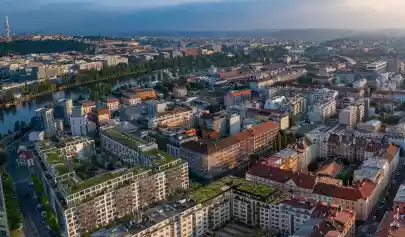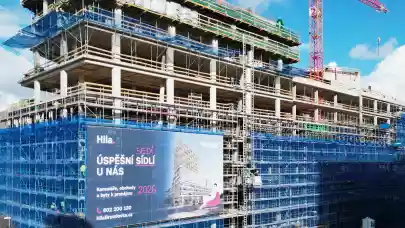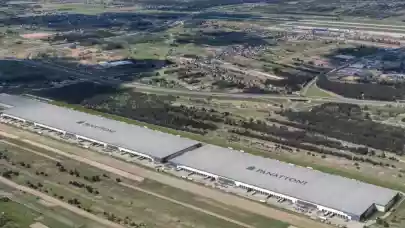
The latest data from Q1 2023 show a recovery of the new flats market in Prague. Quarter-on-quarter, sales increased by almost a fifth. The mortgage market, which has also seen a rally in recent months, but also the return of investors, will have an impact on further developments. Neither offer nor sale prices have changed significantly compared to the previous period. This is mainly due to persistently high construction costs, slow permitting of new construction and temporary postponement of some planned projects, according to the market analysis of development companies Trigema, Skanska and Central Group.
The beginning of this year confirmed the expected recovery of the new housing market, which is accompanied by a slight decline in the interest rate on mortgages, and therefore higher interest in their acquisition. According to the March results of the CBA Hypomonitor, the volume of mortgages granted reached the highest level since last June, when the market began to cool down noticeably. Growing sales of new flats and mortgage volumes thus prove that the interest in new flats in Prague persists. Moreover, spring is typically the most vital sales season, so a continuation of the positive trend can be expected in the coming period. The market may grow even faster as interest rates fall more sharply, which could approach around 3% by the middle of next year.
"The calming of nervousness about the energy crisis, the stabilization of new housing prices and a number of promotional programs. All of this has translated into demand and helped to revive the new housing market. In addition to a slight increase in clients with mortgages, however, buyers are still dominated by investors who finance the purchase from their own resources and put their savings in a safe place against the still high inflation," said Petr Michálek, Chairman of the Board of Skanska Residential a.s. In the first quarter of this year, 650 new flats were sold in Prague, an increase of 18% compared to the previous quarter. Year-on-year, sales are down by about 38%, but this compares to a period when base interest rates were roughly half of their current level. At the same time, the CNB's new mortgage lending rules, which came into force in April 2022, were not yet in force, allowing prospective buyers to take out loans for up to 80% of the value of the property and only if they provide the bank with proof of sufficient income.
Price stability persists in the new flats market
Prices of new flats in Prague continued to grow slightly in the first quarter of this year. The average selling price reached CZK 151,951 per sqm (€6,550 per sqm) and the average asking price reached CZK 154,990 per sqm (€6,580 per sqm). This represents a year-on-year increase of 4% for both prices. Quarter-on-quarter, prices are stagnating. The average selling price increased by 0.2% and the average asking price by 0.1%. Prices of building materials have partially stabilised, but are still on average around 40% higher than at the beginning of 2021. However, price volatility persists for some commodities, making it difficult for developers and construction companies to predict future developments and calculate total project costs.
In the short term, it is therefore possible to expect continued price stagnation for new buildings. On the other hand, price reductions may continue for secondhand properties, but compared to last year, it will not be such a big drop. "Prices of new apartments in Prague rose by 4% year-on-year, while prices of older apartments fell by 6%. This continues to open the scissors between the prices of new and older flats. And rightly so, because the quality standard of new buildings is diametrically better. New flats are also up to half less energy-intensive than older prefabricated flats," says Dušan Kunovský, founder and head of Central Group.
Supply stagnates in the range of the long-term average
At the end of Q1, 5,550 new apartments were vacant in Prague. This is a roughly 9% increase quarter-on-quarter and a 73% increase compared to the first quarter of 2022 when supply was brought down to a record low in 2021. It is currently at the long-term average level, but it is still half the number that could cover the long-term needs of the Prague market.
Despite the record number of new flats permitted in Prague, almost 1,500 since the beginning of this year, the permitting of new construction is still slow. At this rate, about 9,000 flats would be permitted this year, while the long-term need of the metropolis is at least around 10,000 per year. Moreover, some of the new supply will end up with institutional investors in the future and will not reach the direct market. If the current situation remains unchanged and supply is insufficient to cover the volume of sales when interest rates fall to around 3%, sales prices may rise again. "Despite the year-on-year comparison, we cannot speak of a shortage of apartments. Prague would need at least twice as many, but more likely three times as many new flats to meet the demand for housing. Moreover, the current situation is merely a postponement of demand, which will most likely resume with the reduction in interest rates. Moreover, this year the supply will be shuffled by institutional investors who will turn some of the vacant apartments into rental housing," says Marcel Soural, Chairman of the Board of Directors of the Trigema investment group.



